Review | ‘The Sentence’ by Louise Erdrich
Set in 2020, Louise Erdrich’s Latest Novel Is Brimming with Wonders

I’m not sure why it took me so long to read Louise Erdrich. I’ve seen her name on lists of best books in literary journals and other places, and knew that she’d won a Pulitzer Prize, but despite the fact that one of her early novels, Love Medicine, has sat on my shelf for nearly three years, as if waiting patiently for me to chance upon it, I’d not read her. Fortunately, it’s never too late to “discover” an author and be spun off into a new reading universe. My reading future will definitely include many books from Louise Erdrich’s canon.
The Sentence defies easy description. It’s a finely crafted polymorphous novel, part ghost story, part family drama, part redemptive tale, set in Minneapolis during the fractious spring and summer of 2020 when the pandemic raged and George Floyd was murdered by the police. But it’s also about the love of books and words and stories, and the life-altering power of reading.
“I am an ugly woman,” the narrator, whose name is Tookie, tells us. “Not the kind of ugly that guys write or make movies about, where suddenly I have a blast of blinding instructional beauty. I am not about teachable moments.” Tookie is self-aware, probably because of her years in prison, which is where she begins her story, recounting how she was sentenced to 60 years for stealing a body. Though admittedly guilty, there are mitigating circumstances, not that it matters to the sentencing judge. Tookie is claustrophobic and so terrified of confinement that she tries to kill herself by tearing up her prison-issued paper clothing and stuffing her nose and mouth. For this she’s placed in the segregation unit for a year, stripped of her books and her precious American Heritage dictionary. She survives solitary confinement by recalling passages from the books she has read.
After seven years in Waseca prison, Tookie’s sentence is commuted and she’s set free. The outside world has changed. Minneapolis has changed, as Tookie discovers on long bus rides through the city. She finds work and community in a bookstore. She doesn’t simply love books, she reveres them, communes with them. Matching a customer with the perfect recommendation brings Tookie intense satisfaction.
Tookie reunites with Pollux, the tribal policeman who arrested her all those years before. Pollux has a daughter, Hetta, with whom Tookie has a bumpy relationship. Other than that complication, life with Pollux is tender and loving. “Now I live as a person with a regular life,” Tookie says. “A job with regular hours after which I come home to a regular husband.” She lives, she says, the way a person does who has ceased to dread each day’s ration of time.
The haunting comes when Flora, one of Tookie’s most annoying regular customers, a white woman who claims to have indigenous lineage, a claim Tookie doesn’t buy for a minute, dies. In life Flora was sincere, well-intentioned, generous, a hard person to dismiss or ignore. She loved books more than she loved people, and in fact the book she was reading when she died will have a significant impact on Tookie, driving her almost to madness. Flora begins haunting the bookstore, making her presence known to Tookie by rearranging papers and tipping books from the shelves. Why won’t she leave? What does she want, and why is Tookie the only one who senses her presence?
The pandemic arrives on the heels of Flora’s death and her haunting of the bookstore, those dark early days when little was known about the virus and how it was passed, and people hoarded canned goods and toilet paper and businesses shut their doors. Everyone is talking about underlying health conditions and ventilators, masks and face shields and gloves, and death. Tookie and Pollux hold each other against the sudden uncertainty. Pollux has asthma and when he contracts COVID, it will be touch and go.
Some of the most evocative writing in The Sentence revolves around the murder of George Floyd, which resonates in the indigenous community because it has been a target of police violence for as long as the oldest elder can remember. Through the experience of Tookie and Pollux we see and feel what it was like in the aftermath, when protesters clashed with police and buildings burned and clouds of tear gas hovered over the streets, sirens wailed, and the city was under curfew, patrolled by Humvees. Tookie describes it as “Pockets of peace, then full-out soldiers in battle gear.”
“A slow tornado” is how Tookie describes this year. She wants to forget it but at the same time is afraid that she won’t remember all that has happened, the good and bad, all she has learned about herself. “Ghosts bring elegies and epitaphs, but also signs and wonders.”
This book is brimming with wonders.
This review originally appeared in the California Review of Books.




You must be logged in to post a comment.